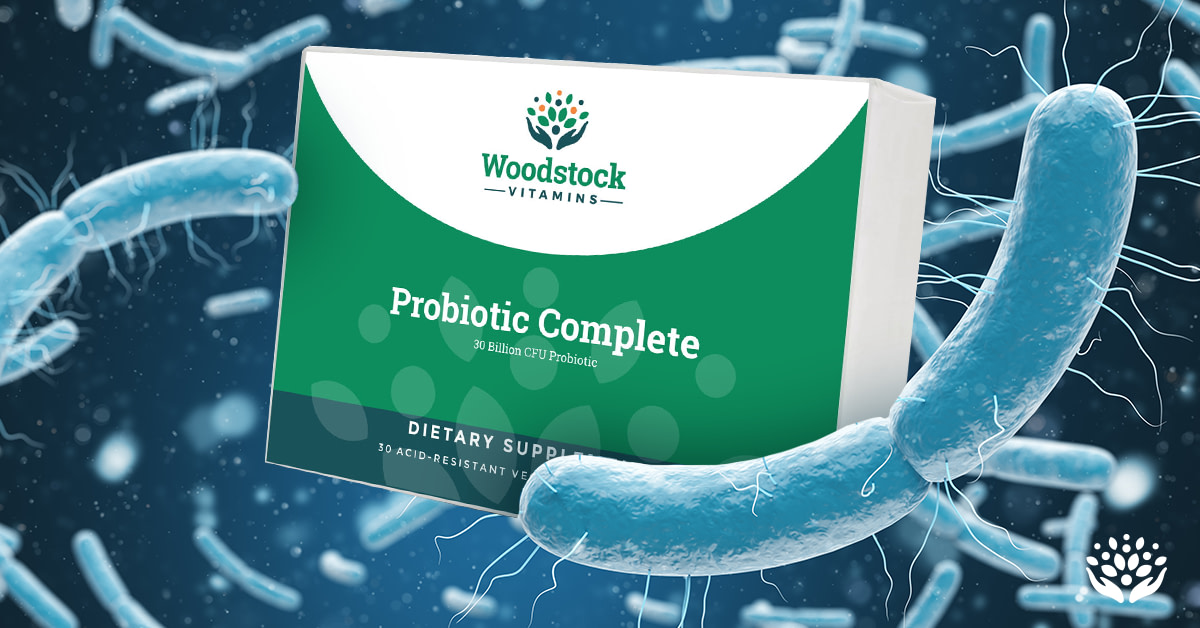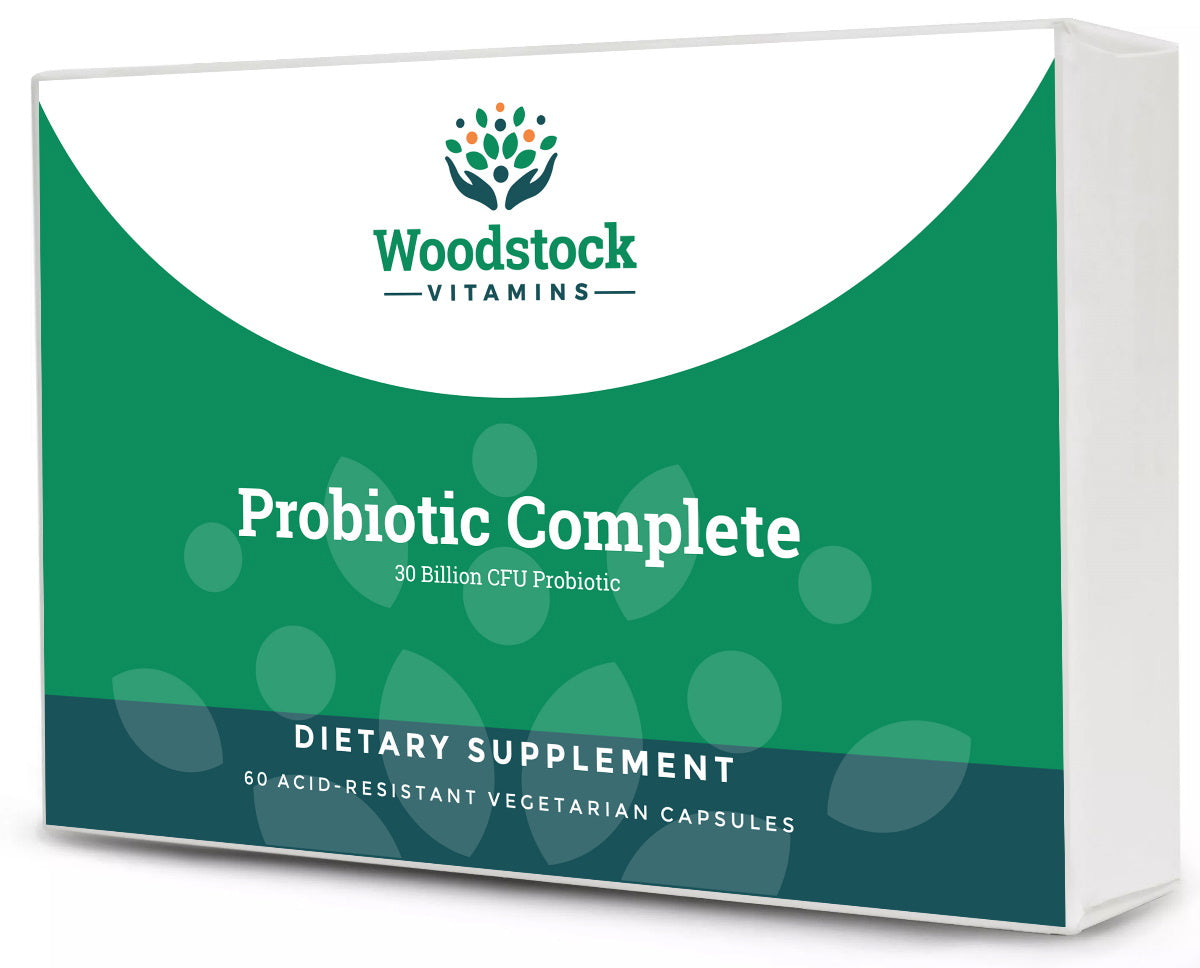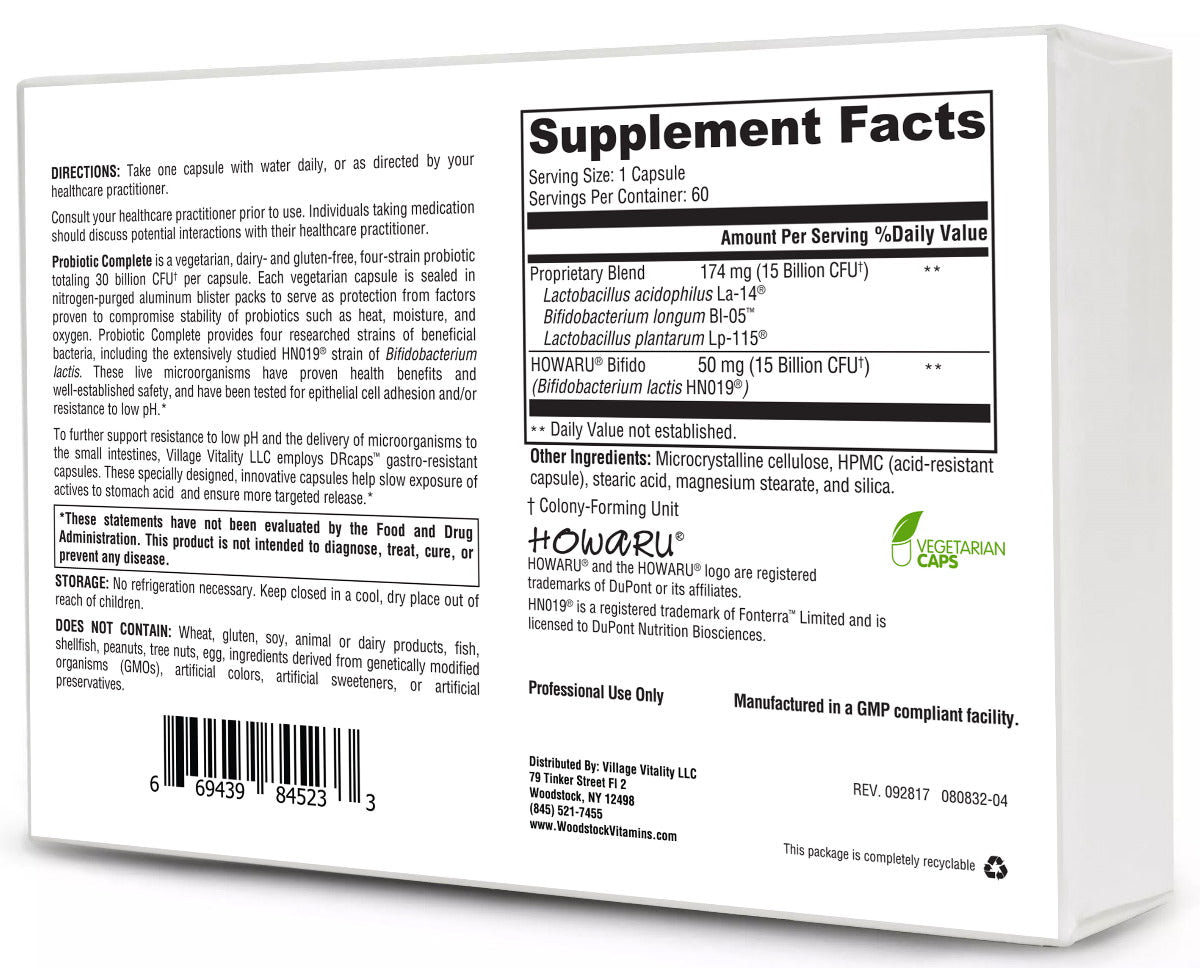
So. You had one too many hot dogs at the end-of-summer barbecue and now your tummy hurts.
While we do hope you’re not currently stuck on your aunt’s toilet as you’re reading this, we hope most of all that you know you’re not alone.
In fact, nearly 70 million people in America struggle with digestive issues — that’s roughly 20% of the population — so you’re in good company!

And with over-processed foods lining the grocery aisles and the stress of the daily grind turning our stomachs into knots, is it any wonder good gut health is hard to come by these days?
That’s why Dr. Neal — holistic practitioner of 20+ years and well-known wellness loudmouth — has emphasized the importance of the gastrointestinal tract in his health frameworks.
Central to this quest for a happy gut are the microbial powerhouses we call probiotics. These supplements have gained popularity in recent years for their role in maintaining digestive balance, but how much do we really know about probiotics outside of TikTok?
Read on, fellow tummy ache survivor, to uncover the truth about probiotics for GI health — and how they’re really helpful for so much more than that.
If you didn’t know it already, your insides are crawling with live bacteria (and yeasts) that live cozy little lives in your organs.
But before you get the heebie-jeebies — not all bacteria are bad.
In fact, the bacteria in your gut work overtime for your overall health, helping you digest foods, synthesize vitamins, get the nutrients you need, and keep “bad” bacteria in check. When you have the right balance of good and bad gut bacteria floating around, that’s the elusive “optimal gut health” state you’ve heard about in movies.
Learn More: The Four Pillars of Great Gut Health | Dr. Neal Smoller
You can think of probiotics, then, as the “good” bacteria your stomach needs to stay healthy.
While we always recommend a food-first approach to getting the nutrients (and bacteria) your body requires, it’s not so straightforward when it comes to probiotics. Most of us are getting very little beneficial, bioavailable probiotics from our diets.
(Sorry kombucha lovers, but it’s true.)
That’s why Dr. Neal made probiotics part of his Vital5 — the quintessential quintet of nutrients we need to thrive but don’t quite get enough of in the modern age.
Learn More: 5 Crucial Nutrients (Almost) All of Us Are Lacking

Probiotic supplements can help you get good germs in your gullet, but they really shine when implemented alongside gut-friendly wellness practices and eating habits.
The word holistic is a bit like the word bacteria — we contemporary, science-fearing humans have a lot of strange ideas about what it means. We often mix up holistic with terms like homeopathic, and it paints a pretty confusing picture.
A holistic approach to health is, simply, one that looks at the whole body or the whole being for root causes and long-term healing. We don’t just slap temporary band-aids on chronic symptoms around these parts — we dig deep.
Probiotics are considered holistic because, while they’re (rightfully) touted for their gut health benefits, they actually affect multiple bodily systems and our overall quality of life.
Don’t believe us? Keep reading.
“Some people see a clear need for probiotics because their guts are a hot mess.”
Dr. Neal Smoller
Before we dive into the specifics of how probiotics can benefit everything from the immune system to inflammatory diseases, let’s get one thing straight.
Even if you don’t have obvious symptoms of a gut issue, you probably still need probiotic support.
Why?
Because, as Dr. Neal so subtly phrases it, our guts are constantly under attack. An endless stream of stressors, toxins, and medications pairs with rapidly declining food quality and inconsistent nutrient intake to create a perfect, gut-degrading storm.
As a result, our bodies fight a never-ending battle, striving to maintain homeostasis in an environment that’s directly antithetical to health and well-being.
Issues like widespread gut dysfunction and malnutrition are so pervasive that they’re almost impossible to see. Warning signs of bad gut health tend to be normalized and laughed off, and a lot of people don’t deal with their tummy troubles until it’s seriously impacting their lives.
So, to boil it all down, take a probiotic if you:
And skip probiotics if you:

Learn More: 3 Tips for Buying the Right Probiotic Supplement
Plus, as we’ve alluded, the benefits of probiotics go far beyond the tummy
Nothing in the body exists or functions independently, so it should come as no surprise that, actually, 70-80% of your immune system is located in your gut. Functionally, that means that the cells responsible for helping your body fight sickness and balance inflammation — the core roles of the immune system — are doing their job from within your GI tract.
So while you might say, “I take probiotics for gut health,” there is no real separation between gut health and immune health.
Taking probiotics can support both the GI and the immune system’s adaptive functions by creating a viable home for those immune cells in the gut microbiome. It’s a two-for-one, folks — what’s not love?
Ever wonder why so many gut-based issues are discovered to be symptoms of inflammatory or autoimmune diseases? Well, that inextricable link between our immune systems and our gut microbiomes has its downsides, too.
The microscopic life inside your gut can impact both your immune system’s ability to function and to discriminate between the self and foreign invaders. Understanding this context is the first step to understanding how poor gut health can play a role in autoimmunity and inflammatory disease development.
But it’s not all doom and gloom! As we now know, we can target the immune system and gut microbiome in one fell swoop with a comprehensive blend of probiotic strains.


Some of the most common symptoms of inflammatory gut diseases that probiotics can help combat are:
Learn More: Probiotics Unmasked: Dispelling 4 Common Misconceptions About Probiotics
Yep, it’s true! Your gut health can even influence your nervous system, and subsequently, your mental health.
Serotonin, the neurotransmitter that’s been nicknamed the “happy chemical”, has been at the forefront of conversations on mental illness for a hot minute now. But how many of us knew that serotonin is produced in the gut before we heard it from Dr. Neal?
That major gap in public health education gets elucidated every time we discuss mental health and the gut-brain connection.
Scads of recent research links poor gut health, or gut dysbiosis, to anxiety and depression and the field of study continues to grow.
Turns out, instead of probiotics being a two-for-one, they’re really a five-or-six-for-one type of data-backed supplement.
Scratch that.
Probiotics can also help support proper urinary functioning and health, so we’re getting pretty close to just calling these microbial strains a panacea.
When the good bacteria encapsulated in your probiotic supplement is introduced to to your gut microbiome, it roves about your intestines leaving a trail of positive effects in its wake. When properly formulated, these beneficial strains can survive long enough to reach your urinary tract system and improve the microbiome there, too.
Translation? UTIs have met their match.

TL;DR — Probiotics are totally worth the gut-health hype they get, but don’t pigeonhole them! The benefits of a comprehensive probiotic show up in the whole body, not just the stomach.
By the same token, if you’re currently struggling with tummy troubles, a probiotic supplement that contains highly studied strains might be what gets you back to the family barbeque. Chat with an expert first to avoid wasting time and money — our Counterside Consults are always open and always free.

Shop the Vital 5
Peek behind the curtain of supplement industry misinformation and enjoy special promotions, podcast episodes, and our No-BS approach to holistic care, sent weekly.

We built the model for finding supplements that work for your wellness, your wallet, and the world. Learn More
Peek behind the curtain of supplement industry misinformation and enjoy special promotions, podcast episodes, and our No-BS approach to holistic care, sent weekly.

We built the model for finding supplements that work for your wellness, your wallet, and the world. Learn More
These statements have not been evaluated by the Food and Drug Administration. This product is not intended to diagnose, treat, cure or prevent any disease.
Use only as directed. Consult your healthcare provider before using supplements or providing supplements to children under the age of 18. The information provided hereinis intended for your general knowledge only and is not intended to be, nor is it, medical advice or a substitute for medical advice. If you have or suspect you have a specific medical condition or disease, please consult your healthcare provider.

By clicking “Accept”, you agree to the use of cookies on your device in accordance with our Privacy and Cookie policies